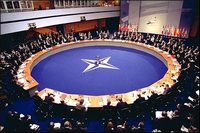NATO has undergone many changes since its inception in 1949, but its commitment to collective defense has remained intact. During the Cold War, the strong wording of the North Atlantic Treaty's Article 5, which states that "an armed attack against one . . . shall be considered an attack against them all," helped deter a confrontation between East and West in Europe. Despite a sea change in NATO's strategic context, membership, activities and functions, Article 5 has retained an almost mythical quality, enshrining the alliance's fundamental pledge: e pluribus unum. Thus, despite the intense deliberation on NATO's future surrounding the drafting of the alliance's new Strategic Concept, the issue of Article 5 has not received much scrutiny. It is still perceived as what defines and gives meaning to the alliance, and is seen as a reflection of NATO's strength in the eyes of would-be adversaries.
Yet, beyond the rhetoric of summit declarations and keynote speeches, the relevance and meaning of Article 5, and of the security guarantees it embodies, have become increasingly problematic. Three major challenges present themselves. First, whereas the Soviet Union provided a common threat during the Cold War, NATO now operates with a more diverse agenda, provoking disagreement on how much emphasis should be placed on the collective defense of individual members. Second, the precise meaning of Article 5 -- including when it should be invoked and what responses it might prompt -- has also become less certain, leading to uneven expectations as to its use and implications. Third, linked to the issues of capability and interpretation, it is uncertain whether the alliance's internal solidarity is sufficiently strong to guarantee an "unflinching commitment to territorial defense," in the words of NATO Secretary-General Anders Fogh Rasmussen.
By forestalling open disagreement within NATO, the relative silence on these issues serves a diplomatic function, but it also stifles the search for a constructive solution. Three broad possibilities present themselves: reaffirm the security guarantees and do what is necessary to reassure NATO's more vulnerable members; renounce Article 5 altogether and dismiss the guarantees as anachronistic; or chart a middle course that retains Article 5 but revises the expectations that it has fostered. However NATO broaches the issue, coming to a new and shared understanding of Article 5 will serve the alliance better than being caught off-guard and failing to respond to the next unanticipated crisis.

